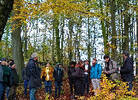4ª Semana Forestal Europea
9-13 de octubre de 2017, Varsovia, Polonia
La Cuarta Semana Forestal Europea tendrá lugar del 9 al 13 de octubre de 2017. Se celebrará conjuntamente con Las2017 (Polonia para 'Forest2017'), la Reunión conjunta del Comité de Bosques e Industria Forestal (COFFI) de la CEPE y la Comisión Forestal Europea (CFE) de la FAO. La Semana Forestal Europea se llevará a cabo en Varsovia, en la cual Las2017 será acogida por el Gobierno de Polonia.
La primera Semana Forestal Europea se celebró en 2008 y desde entonces ha proporcionado una oportunidad única para que los participantes aumenten la visibilidad del sector forestal e influencien los debates paneuropeos y mundiales relacionados con los bosques. Se alienta a las partes interesadas a contribuir y a organizar celebraciones locales y nacionales.
About Forests and the Circular Economy
The circular economy is generally considered as key avenue to sustainable development. It aims to use materials and services efficiently to ensure that “the value of products, materials and resources is maintained in the economy for as long as possible, and the generation of waste is minimized” (European Union, 2015). While it is important that the circular economy does not rely substantially on fossil-based and non-renewable materials with a high environmental footprint, it is equally important that the increased production of bio-based products does not compete with food production and does not have a negative impact on ecosystems, and the climate.
Looking through the lens of circular economy, each harvested tree can supply a wide range of materials and products. All of them are based on a renewable resource and many can be reused and recycled. However, the production of biomass is only one of numerous benefits provided by forest ecosystems. And forest can only provide all their services when they are managed sustainably.
Forests are pivotal for climate regulation, water resources management, biodiversity conservation as well as cultural values preservation, and the local development. Forest ecosystems are a source of bio-based products, which can substitute for non-renewable materials and have a capacity to naturally restore and recycle the quality of their resources. Consequently forest-based industries are strategic to the unfolding and the implementation of the circular economy.
New technologies, business models and consumption patterns are creating opportunities allowing forest-based products to make a much greater contribution to the economy, compared to the traditional role of the forest sector as a provider of timber, paper and pulp and bioenergy.
Circular economy is not about sectors, but about value chains. The key role of the forest sector in a circular economy lies in the fact that it provides biodegradable raw material – a strategic resource that can be used for creation of several advanced, reusable and recyclable bio-materials. These materials can feed into various value chains and prompt transformation in a number of strategic sectors of the economy such as construction and manufacturing (e.g. automotive, home and IT appliances, textiles, packaging etc.). The most illustrative examples of the emerging forest-based value chains are: wood-based construction, textiles production, and bioplastics.
Local event in Germany

Discover Beech Symposium: Discovering the importance of European Beech Forests
7-8 November 2019
Eberswalde University for Sustainable Development, Germany
Organized by the European Beech Forest Network and funded through the Citizens Engagement Activity Fund, under the framework of Interreg Volunteer Youth (IVY), the event brought together beech forest experts from across Europe, students from a local committee of the International Forestry Students‘ Association and key stakeholders from the local community.
Local event in Galicia, Spain
Generational Succession in the Sawmill Industry: Forestry Engineers Committed to Rural Development through Forest Industry
5 November 2019
Organised by the Galician Forest Industry Agency (XERA), in collaboration with the University of Vigo, Faculty of Forestry, and the Galician Forest Harvesting Contractors and Sawmills Federation, the event will include the Presentation of the Forest Industry Boost Agenda, and a visit to the Maderas Hermanos Castro, a sawmill located in a rural area of the province of Pontevedra affected by the wood pine nematode.








